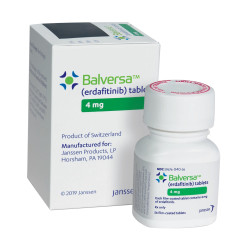Balversa (erdafitinib), a drug targeting bladder cancer introduced in Korea in late 2022 and is in its third year of approval, is about to make its first attempt for reimbursement.
Amid the expected increase in the financial burden posed by bladder cancer treatment, attention is now focused on how the government will resolve Balversa's reimbursement issues along with Astellas' Padcev (enfortumab vedotin), which submitted its application for reimbursement ahead of Balversa.

Janssen Korea applied to the Health Insurance Review and Assessment Service (HIRA) late last year for Balversa's coverage.
It was more than two years after Balversa received its initial approval from the Ministry of Food and Drug Safety (MFDS) on Nov. 24, 2022.
There were several reasons for the delay.
Balversa was initially approved for treating “adult patients with locally advanced or metastatic urothelial carcinoma of the urothelium (bladder cancer) with FGFR2 or FGFR3 mutations whose disease progressed during or after treatment with at least one chemotherapeutic agent, including platinum-based chemotherapeutic agents, or whose disease progressed within 12 months of preoperative adjuvant or postoperative adjuvant therapy with platinum-based chemotherapeutic agents” based on response rates and duration of response in early clinical trials.
In the meantime, however, immuno-oncology has become an important treatment option for bladder cancer, and the treatment landscape for locally advanced or metastatic patients has changed significantly.
In Korea, with the reimbursement of maintenance therapy with Bavencio (avelumab) in the first-line treatment and Keytruda (pembrolizumab) monotherapy in the second-line treatment, it has become important to demonstrate the efficacy of Balversa in patients receiving anti-PD-(L)1 immuno-oncology.
Against this backdrop, Janssen Korea finalized the MFDS’ approval of Balversa as late as last September through the global phase 3 THOR study conducted on patients previously treated with an anti-PD-(L)1 immuno-oncology agent.
The final revised approval for Balversa is for “treating adult patients with operatively unresectable locally advanced or metastatic urothelial carcinoma of the urothelium (bladder cancer) with a mutation in the FGFR3 gene whose disease progressed during or after treatment with at least one prior systemic therapy including a PD-1 or PD-L1 inhibitor.”
The inclusion criteria have been narrowed to patients with treatment records using PD-(L)1 immuno-oncology agents, and its types of mutations were also reduced from “patients with FGFR2 or FGFR3 mutations” to “patients with FGFR3 mutations.”
In addition, Astellas' recently developed antibody-drug conjugate (ADC) Padcev has emerged as another variable to Balversa’s reimbursement.
Initially competing in the same treatment tier as Balversa, Padcev's emergence as the first-line treatment option heralded a rapid increase in the government’s insurance funding for bladder cancer treatment.
Typically, as a new drug moves up the treatment ladder, the number of eligible patients increases, and the duration of the drug increases. Moreover, Padcev's first-line treatment is a combination therapy with Keytruda, which will further increase its financial impact.
Astellas also submitted a benefit application for Padcev late last year, increasing the likelihood that the government will review both Padcev and Balversa simultaneously.
Accordingly, industry insiders are interested in seeing how the government balances clinical needs and financial stability in its review of the two drugs.
Related articles
- J&J Innovative Medicine’s Balversa offers new hope for urothelial cancer patients with FGFR mutations
- Padcev combo therapy shows excellent effect on Asian patients with urothelial carcinoma. What's next?
- ‘Keytruda-Padcev combo attains 3-year survival in urothelial cancer, needing expanded coverage’
- Edgecare’s wearable ultrasound for bladder monitoring wins Korea nod
- Many women misdiagnose bladder cancer as cystitis, expert warns
- Urothelial cancer patients give up on treatment due to lack of insurance coverage

